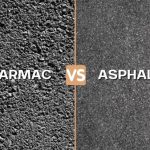Asphalt, a naturally occurring material, has been essential in the development of road systems for centuries. From ancient lake asphalt deposits to the modern asphalt paving we see on today’s highways, the history and evolution of this durable paving material is fascinating. This article will explore the rise of asphalt and how it has become a go-to material for road construction, particularly in urban areas. We will also dive into the natural asphalt paving found in lakes, how it differs from its petroleum-based counterpart, and its growing importance in today’s road maintenance efforts.
What Is Natural Asphalt Paving?
Natural asphalt, also known as rock asphalt, is a form of asphalt that occurs naturally, primarily in lakes and underground natural asphalt deposits. This material has been used for thousands of years, long before the manufactured asphalt mixtures we use today. One of the most famous sources of natural asphalt is Trinidad Lake, which has supplied high-quality asphalt material for road construction since the early 19th century.
What Is Natural Asphalt Made Of?
The composition of natural asphalt consists of bitumen, a sticky, black substance mixed with sand, clay, and water. This natural bitumen forms the basis of asphalt pavement, creating a strong bond when used as an asphalt binder for aggregate materials. Over time, pressure and heat transform organic materials into solid natural asphalt, making it ideal for road surfaces.
The Historical Significance of Natural Asphalt
The First Use of Natural Asphalt for Paving
The use of natural asphalt dates back to ancient civilizations. Around 625 BC, the Babylonians used it to pave roads and waterproof buildings. The Egyptians also used bitumen in the construction of their famous pyramids. Fast forward to the early 1800s, and natural asphalt from Trinidad Lake was being used to pave Pennsylvania Avenue in Washington—one of the earliest recorded uses of this material for asphalt paving in the United States.
The Evolution of Asphalt Paving
Over time, as industrialization took hold, the demand for more durable and smoother roads increased. Engineers began experimenting with different forms of asphalt mixtures, leading to the rise of manufactured asphalt—primarily made from petroleum asphalt. This form of asphalt was more accessible and easier to produce in large quantities.
However, despite the shift toward manufactured asphalt, natural asphalt paving remained a high-performance alternative due to its durability, weather resistance, and ease of application. Cities like Philadelphia and New York continued to source lake asphalt from natural deposits well into the 20th century, appreciating its long-lasting properties for pavement construction.
Natural Asphalt vs. Manufactured Asphalt
What Makes Natural Asphalt Different?
The main difference between natural asphalt and manufactured asphalt lies in how they are produced. Natural asphalt is formed through millions of years of geological processes, while manufactured asphalt is created by refining petroleum asphalt and mixing it with aggregate. While both types of asphalt are effective for paving, natural asphalt has some unique advantages.
Natural asphalt does not require the addition of chemical binders or high temperatures for application, unlike hot mix or cold patch asphalt, which rely on chemical reactions to harden. This makes natural asphalt more reliable in extreme weather conditions and quicker to set, reducing risks and road maintenance time.
The Benefits of Natural Asphalt
One of the greatest strengths of natural asphalt paving is its ability to withstand harsh weather conditions. Whether it’s freezing temperatures or scorching heat, natural asphalt maintains its stability, making it ideal for regions with extreme climates. Moreover, its durability means fewer repairs and lower costs in the long run, which is why many municipalities and organizations are opting to use natural asphalt for road construction.
Additionally, natural asphalt is a more eco-friendly option. It requires less energy to produce compared to petroleum-based asphalt, and it is fully recyclable. This makes it a sustainable choice for those looking to reduce their environmental impact while still enjoying the benefits of strong, long-lasting roads.
The Future of Asphalt Paving: Sustainability and Innovation
The Rise of Eco Asphalt
As awareness of environmental issues grows, so does the interest in eco-friendly alternatives to traditional paving materials. Natural asphalt plays a significant role in the development of eco asphalt, which focuses on reducing carbon emissions and enhancing the sustainability of production of asphalt. Recycled asphalt, for example, is gaining popularity as a cost-effective and environmentally friendly option for new pavements.
Virgin Asphalt vs. Recycled Asphalt
While virgin asphalt is still widely used in new asphalt mixtures, the benefits of recycled asphalt cannot be ignored. It is not only cheaper than traditional paving materials like gravel, but it also has a lower environmental impact. Many contractors are now turning to recycled asphalt for both its performance and sustainability benefits.
Your Paving Needs Solved with JR Paving & Construction Co Inc
The rise of natural asphalt has revolutionized the way roads are constructed, offering a more durable and sustainable solution for road paving. Whether you’re looking to pave a driveway or construct an entirely new roadway, JR Paving & Construction Co Inc has the experience and expertise to provide high-quality asphalt paving services using the best materials available.
Contact JR Paving & Construction Co Inc today at 800-888-9833 to learn how we can help with your next asphalt paving project. With decades of experience and a commitment to sustainability, we are your trusted partner in road construction and pavement maintenance.
Final Thoughts
The journey of asphalt, from ancient natural deposits to modern city streets, has proven that natural asphalt paving is a reliable, eco-friendly, and high-performing paving material. As we continue to seek out more sustainable solutions for our infrastructure, natural asphalt will likely play an even bigger role in shaping the roads of the future. For now, its strength, durability, and environmental benefits make it a top choice for anyone looking to build lasting, high-quality roads.



